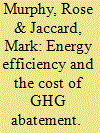|
|
|
Sort Order |
|
|
|
Items / Page
|
|
|
|
|
|
|
| Srl | Item |
| 1 |
ID:
169741


|
|
|
|
|
| Summary/Abstract |
A growing number of cities have set ambitious mid-century targets for greenhouse gas (GHG) emissions reduction and increased use of renewable energy. Using the municipal jurisdiction of Vancouver, Canada as a case study, we integrated an energy-economy model with an urban land-use and infrastructure model to test the possible actions resulting from policies potentially available to this city government in pursuit of its 2050 target of 100 percent renewable energy and an 80 percent reduction of GHG emissions. We found that, while cities like the one we studied have some important options for reducing energy use by their inhabitants, they may lack the authority to completely transform the energy system, especially for causing a wholesale switch to renewable energy for deep decarbonization. To achieve such ambitious energy and GHG targets, cities with jurisdictional powers comparable to the city we studied are dependent to some degree on complementary GHG and energy policies from senior levels of government.
|
|
|
|
|
|
|
|
|
|
|
|
|
|
|
|
| 2 |
ID:
179721


|
|
|
|
|
| Summary/Abstract |
Carbon pricing is widely recognized as the most economically efficient policy to reduce greenhouse gas emissions. However, its high-cost visibility creates political challenges for its implementation at a sufficiently stringent level to achieve deep decarbonization. Flexible regulations, such as renewable portfolio standards and low-carbon fuels standards, incorporate flexibility mechanisms similar to carbon pricing, but seem to face lessor political acceptability barriers. Unlike prescriptive (command-and-control) regulations, flexible regulations do not require technologically-specific compliance pathways and allow credit trading to reduce costs and incentivize innovation. Despite their potential for driving the decarbonization transition, there is comparatively little research on the design and impact of flexible regulations implemented to date. This comparative policy analysis examines government policy documents and academic literature to identify flexible climate regulations implemented in OECD countries and evaluates their implementation context, design characteristics, effectiveness, and public support. In total, 61 unique flexible regulations were identified across 11 countries and 42 sub-national jurisdictions that can be classified into six categories. Findings suggest that as jurisdictions seek to strengthen their climate policy portfolios, flexible regulations can provide a relatively cost effective, broadly supported, and complementary tool to achieve deep emissions reductions, so long as policies are well-designed and interaction and equity impacts are considered.
|
|
|
|
|
|
|
|
|
|
|
|
|
|
|
|
| 3 |
ID:
110397


|
|
|
|
|
| Publication |
2011.
|
| Summary/Abstract |
A highly influential report by the McKinsey consulting firm suggests that a large potential for profitable energy efficiency exists in the US, and that substantial greenhouse gas emissions reductions can therefore be achieved at a low cost. This result is consistent with other studies conducted using a bottom-up methodology that dates back to the work of Lovins beginning in the 1970s. Research over the past two decades, however, has identified shortcomings with the conventional bottom-up approach, and this has led to the development of new analytical frameworks that are referred to as hybrid energy-economy models. Using the CIMS hybrid model, we conducted simulations for comparison with the McKinsey results. These exercises suggest a more modest potential to reduce greenhouse gas emissions at a given marginal cost, as well as a smaller contribution from energy efficiency relative to other abatement opportunities such as fuel switching and carbon capture and storage. Hybrid models incorporate parameters reflecting risk and quality into their estimates of technology costs, and our analysis suggests that these play a significant role in explaining differences in the results.
|
|
|
|
|
|
|
|
|
|
|
|
|
|
|
|
| 4 |
ID:
105824


|
|
|
|
|
| Publication |
2011.
|
| Summary/Abstract |
The dramatic scale-up of renewable energy over the coming decades is likely to pose significant challenges for coordinating land use allocation, environmental assessment, energy system planning and the design of greenhouse gas abatement policy. Of particular concern is the establishment of institutions and processes that enable consideration of multiple objectives and attributes, with adequate representation of affected interests, and without resulting in excessive delays in the development of renewable energy as part of a greenhouse gas abatement strategy. This paper uses the Canadian province of British Columbia as a case study for describing these challenges and the responses of policy makers seeking to rapidly scale-up renewables. Using evaluative criteria to assess this experience, we identify lessons that may be applicable to other jurisdictions seeking to quickly expand the production of renewable energy. These lessons include the design of institutions and processes that would likely be required in almost any jurisdiction with similar aims.
|
|
|
|
|
|
|
|
|
|
|
|
|
|
|
|
|
|
|
|
|